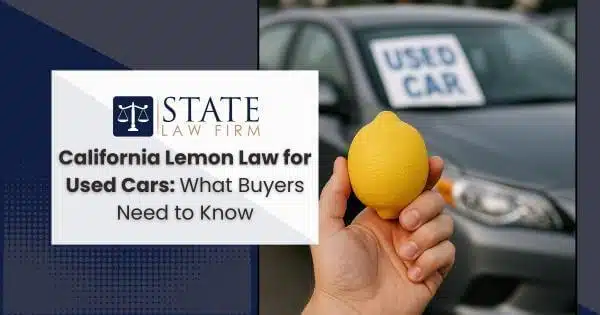Buying a used car should feel like a smart move, not a gamble. However, for many Californians, that excitement can quickly turn into frustration when hidden defects or recurring repairs emerge. Fortunately, the California Lemon Law isn’t just for new vehicles—it can also apply to used cars under specific conditions, offering buyers robust protections when things go wrong.
A 2022 survey found that nearly one in five used car buyers reported issues with their vehicle within the first month of ownership, with many facing costly repairs or safety concerns. (Source)
Understanding your rights under the Lemon Law can make all the difference in protecting your investment and ensuring your safety. At State Law Firm, our team of young, driven attorneys is committed to helping clients navigate complex legal challenges, whether that means getting traffic camera footage for a car accident claim or holding sellers accountable under consumer protection laws. We’ve seen firsthand how frustrating it can be to feel stuck with a defective vehicle, and we’re here to guide you through every step of the Lemon Law process.
In this article, we’ll break down what the California Lemon Law says, how it applies to used cars, what qualifies as a “lemon,” and how to file a claim. We’ll also debunk some of the most common myths—and empower you to take action when your rights are on the line.
Ready to protect yourself? Let’s get started.
Understanding the California Lemon Law: A Brief Overview
California’s Lemon Law, officially known as the Song-Beverly Consumer Warranty Act, was designed to protect consumers who purchase or lease vehicles that are defective. While it’s most commonly associated with new cars, the law can also apply to used vehicles, especially those that are sold with a warranty, either from the manufacturer or the dealer.
At its core, the Lemon Law gives consumers the right to a refund or replacement if their vehicle has a substantial defect that cannot be repaired after a reasonable number of attempts to do so.
Here’s how it applies to used cars:
- The used vehicle must still be under the manufacturer’s warranty or sold with a dealer warranty (even a limited one).
- The defect must substantially impair the vehicle’s use, value, or safety.
- The seller/manufacturer must have had a reasonable opportunity to rectify the issue.
This law isn’t just a policy—it’s a lifeline for car buyers stuck with unreliable or unsafe vehicles. With the cost of used cars in California steadily rising, knowing your rights has never been more crucial.
What Qualifies as a “Lemon” Under California Law?
Not every minor glitch qualifies your vehicle as a lemon, but serious, unresolved issues that impact the car’s performance or safety do. California law considers a vehicle a lemon if it meets the following criteria:
- The vehicle has a substantial defect (e.g., engine failure, faulty brakes, electrical issues).
- The defect first appeared while the car was under warranty.
- The seller or manufacturer has had multiple chances to fix the issue, but it remains unresolved.
Pro Tip:
Don’t ignore what feels “off” in your vehicle—document every repair attempt, no matter how minor. Your service records can be the difference between a rejected claim and a successful resolution.
Even used cars purchased “as is” might qualify if the dealer included a warranty or implied promises during the sale. A strong case often starts with a thorough paper trail.
Buyer’s Rights Under the California Lemon Law for Used Cars
Many used car buyers assume they’re out of luck once they drive off the lot, but California’s Lemon Law says otherwise. If your car qualifies, you may be entitled to:
- A full refund of the purchase price (minus mileage deductions)
- A replacement vehicle of similar value and condition
- Reimbursement for related expenses, including towing and rental cars
- Coverage of attorney’s fees if legal action is necessary
These rights don’t require you to face the dealership alone. At State Law Firm, we regularly help clients navigate disputes with dealerships and manufacturers, even when the odds feel stacked against them.
The Process of Filing a Claim Under the California Lemon Law
Getting justice under the Lemon Law involves more than just frustration—it requires precision. Here’s a simple breakdown of the process:
1. Gather Documentation
Keep copies of:
- Purchase contracts
- All repair orders and receipts
- Written communication with the dealer or manufacturer
2. Notify the Manufacturer or Dealer
Let them know—in writing—that you believe the car qualifies as a lemon and request a refund or replacement.
3. Allow a Final Repair Attempt
In some cases, the manufacturer may request one more chance to fix the issue. This is often required before filing a formal claim.
4. File a Lemon Law Claim
If the issue still isn’t resolved, you may file a claim through arbitration or legal channels.
Pro Tip:
The process can be time-sensitive. Claims are generally easier to resolve before the warranty expires, so don’t wait. Need help understanding how to strengthen your documentation? You can start by checking out our guide to getting traffic camera footage—a similar process applies when requesting service records or proof of defect.
Common Myths and Misconceptions About the California Lemon Law
There’s a lot of misinformation out there. Here’s what you shouldn’t believe:
- “Used cars don’t qualify.”
False. If a warranty is involved—even a limited one—used cars can qualify. - “The dealer said it was sold ‘as is,’ so I have no rights.”
Not always true. If the car came with any warranty, you may be protected. - “I have to pay for a lawyer out of pocket.”
Wrong. If you win your Lemon Law case, the manufacturer may be required to pay your legal fees.
Pro Tip:
If something feels off, trust your instincts. Many buyers delay taking action because of these myths. Don’t be one of them.
Empower Yourself as a Buyer by Understanding Your Rights under the California Lemon Law
No one expects their used car to be a lemon. But if you’re stuck with a defective vehicle, know that you’re not alone—and not powerless.
At State Law Firm, we bring a fresh, determined approach to consumer protection cases. Our team of up-and-coming litigators is not only passionate about getting results—we’re building a reputation for going toe-to-toe with big players when it counts.
You deserve a vehicle that works, and a legal team that works for you.


